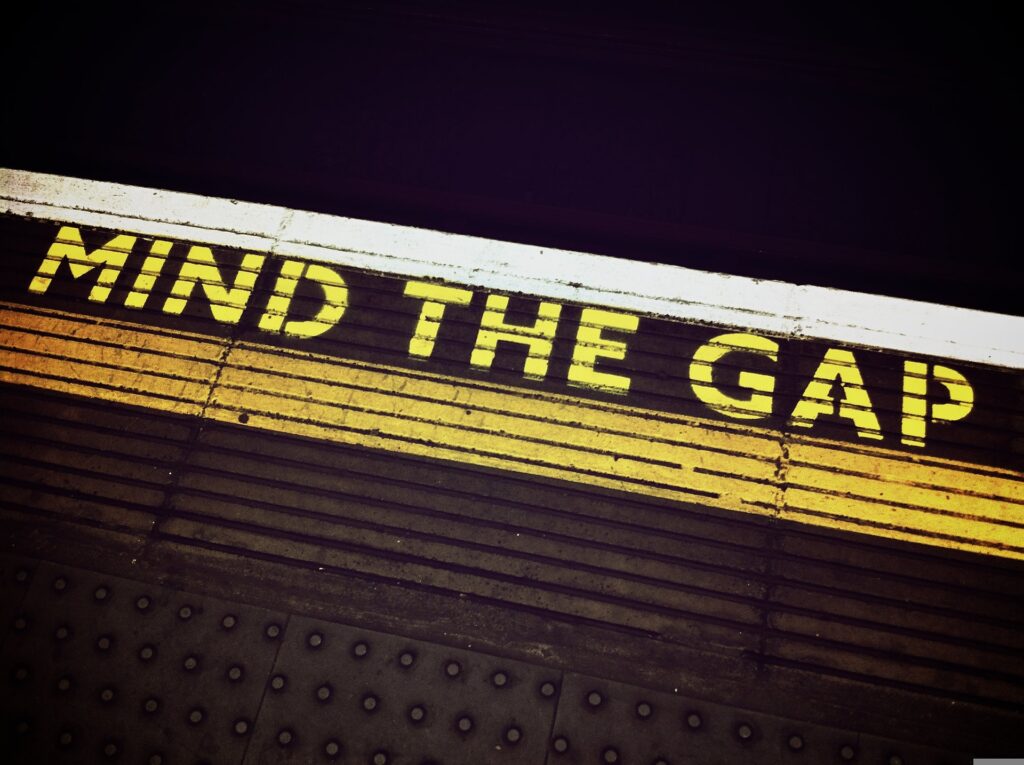
By Deacon Richard Hay
“Mind the Gap”
If you have ever visited London and used their subway system, it is very possible you have seen this seemingly innocent phrase, usually in yellow paint with a thick line before it along the entire train platform.
It serves two purposes – one to remind riders to watch out for the small gap between the platform and the train when they are boarding and two – it cautions you to be careful when there is no train in the station because of the much larger gap from one side of the tracks to the other. Both of these gaps have their perils and “minding the gap” is critically important for our eternal souls as we hear in today’s gospel.
The gap we hear about today is described as a chasm – between the rich man and Lazarus. This gap existed when they were both alive and in very different circumstances – in fact starkly different – and that same gap exists after their deaths, but the tables are turned.
In life, Lazarus was the forgotten one – the rich man would not pay any attention to him although Lazarus laid at the rich man’s door where he would walk past Lazarus covered in sores and hungry. The rich man did not think Lazarus was worth his time or attention.
This created a huge gap in their earthly lives and existence however, when they both died, things changed significantly.
The rich man finds himself in torment and when he looks up, he sees Lazarus being cared for like he had never been cared for before. The rich man then tries to negotiate with Abraham to have Lazarus come and bring him just a small drop of water to cool him off, Abraham reminds the rich man that he had all that was good while on earth while Lazarus had nothing. Abraham reminds the rich man that there is now a great chasm, a great gap, between him and Lazarus and it is there so that no one can cross it.
The chasm between the rich man and Lazarus seems insurmountable as this story concludes and it is. The rich man has reached a point where the actions of his life on earth are irreversible – there is no going back for him – no opportunity to improve his standing.
The parable reinforces the fact that the rich man did a very poor job of “minding the gap” between him and Lazarus on earth – and that gap cannot be changed after they have both died. No second chances in this parable.
Now this parable is not about condemning those who have riches, anyone of any stature could find themselves dealing with this huge gap in their lives. However, could the rich man have tried to make a difference in his life to lessen this great chasm in the afterlife?
Sure he could have. Just one of those times as he walked past Lazarus outside his door, he could have done like the Good Samaritan did when he saw the victim of robbers on the side of the road and gotten Lazarus’s wounds treated, provided him some food and drink, and helped improve Lazarus’s earthly existence.
When we hear a gospel like this today, it can be very uncomfortable, maybe even causes us to squirm a bit in our seats. First, that is OK because it is our conscious reminding us of where we stand when it comes to “minding the gap” between us and those who are less fortunate.
The key is – do we listen to our conscious? If we do, then we are already making strides to “minding the gaps” in our lives. If not, then maybe we should spend some time in prayer and take a closer look at that part of our life.
The main aspect of “minding this gap” is love – the love of Christ. Recall that when Jesus was asked what the greatest commandment was, he said that we were to love the Lord, our God, with all our heart, with all our soul, and with all our mind. He then quickly added that the second greatest commandment is that we should love our neighbors as ourselves.
If we approach everyone we encounter in the world – family, friends, co-corkers, the stranger on the streets, with the love of Christ, we will then be “minding the gap” between us and others – we avoid the great chasm the rich man experienced.
Now take it to another level – the corporal works of mercy which we hear from Christ at the final Judgment in the book of Revelations:
• Feeding the hungry
• Giving drink to the thirsty
• Sheltering the homeless
• Visiting the sick
• Visiting the prisoners
• Burying the dead
• Giving alms to the poor
Christ tells us that if we did any of these things for the least of his brothers – then we did them for him. In other words, we “minded the gap” for the love of Christ and his presence in others.
It takes me back to my homily last month about whether there is a checklist of things to do to receive a heavenly reward. While there might not be a specific checklist, God gives us plenty of examples of what to do and what not to do in order to avoid having a big gap – a chasm – in our own lives.
Our goal this week as we walk away from here is that we should pray about and then address that uncomfortable feeling we might have experienced as we heard this gospel today. We can then take the steps to make sure we do not have a gap between us and anyone else in this world or the next!
